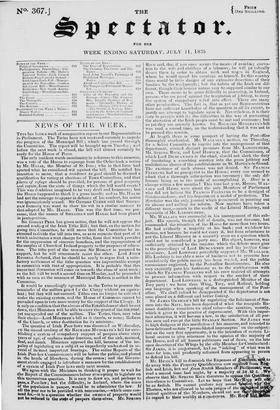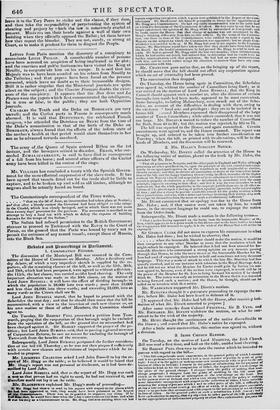NEWS OF THE WEEK.
Tests has been a week of comparative repose to our Representatives in Parliament. The Tories have not ventured seriously to impede the progress of the Municipal Bill ; which has passed through the Committee. The report will be brought up on Tuesday ; and before the next week is closed, the bill will almost certainly be readyfor the House of Peers.
The only incident worth mentioning in reference to this measure, was a vote of the House to expunge from the Order-book a notice by Mr. HALSE, the Member of St. Ives ; who in that form had
sported what he considered wit against the bill. He notified his intention to move, that a residence in gaol should be deemed a
qualification for voting at elections of Town-Councillors, and that
places of refuge shook! be provided, for persons of good property and repute, from the state of things which the bill would create!
This was doubtless imagined to be very droll and humorous; but the House happened to think it a gross insult; and as Mr. these had not the courage to appear in defence of his conduct, his notice
was ignominiously erased. Sir GEORGE CLERK said that SHERI- DAN formerly was wont to show his wit in a similar manner to that adopted by Mr. Mese. This was the first time, we pre- sume, that the names of SHERIDAN and HALSE had been placed in juxtaposition.
Sir ROBERT PEEL has given notice, that he will not oppose the second reading of the Irish Tithe Bill; but that, on the motion for
going into Committee, he will move that the Committee be in- structed todivide the bill into two, so as to separate that part of it which substitutes a rent charge for tithe, from that which provides for the suppression of sinecure benefices, and the appropriation of the surplus of Church of Ireland property to the purposes of educa- tion. The tithe part of the measure Sir ROBERT is prepared to support, but he will strenuously resist the other. Lord JOHN
RUSSELL declared, that he should be ready to argue that a satis- factory settlement of the tithe question was impracticable except
in connexion with that of appropriation. It is probable that this important discussion will come on towards the close of next week ; ns the bill will be read a second time on Monday, and he proceeded with as soon as the measure of Municipal Reform is settled in the Commons.
It would be exceedingly agreeable to the Tories to procure the remainder of the million grant fur the Clergy without an equiva- lent; but they will not succeed. Tithes can no longer be collected under the existing system, and the House of Commons cannot be prevailed upon to vote more money for the support of the Clergy. It is only on condition that the abuses of the Establishment shall be cut down, that Ministers will be able to carry the grant of the:360,00o/. -yet unexpended out of the million. The Tories, then, may take their choice—Lord MORPETH'S bill as it stands, or none; Reform of the Church, or utter destitution for its ministers.
The question of Irish Poor-laws was discussed on Wednesday, en the emend reading of Sir RICHARD MUSGRAVE'S bill for esta- blishing a system of compulsory support of paupers above sixty
years of age, of orphans under fourteen, and of the sick, maimed, deaf, and dumb. Ministers opposed the bill, because of 'the im- policy of legislating on a subject so imperfectly understood in se- veral of its most important bearings. The entire Reports of the Irish Poor-law Commissioners will be before the public,and placed in the hands of Members, (luring the recess; and the Govern- ment stands engaged to introduce a measure for the establishment of a system of Irish Poor-laws early next session. We agree with the Ministers in thinking it proper to wait for the Report of the Commissioners before attempting to legislate on
this momentous question. It is easy to draw up, and perhaps to
pass,a Poor-law; but the difficulty, in Ireland, where the mass of the population is pauper, would be to administer rho law. If
all the poor are to be provided with necessaries,—which some con- tend for,—it is a question whether the owners of property would Pot be reduced to tborptaje of paupers thernielves, Mr. SPRING
Rice said, that it' you once secure the means of avoiding starva- tion to the wife and children of a labourer, he will le iodically
desert them in order to obtain wcrk and wages in England, where lie would spend his earnings on himself. In this country there would be little danger of any extensive desertions of' their families by the workpeople ; but the habits of the Irish are dif- ferent, though their human nature may be supposed similar to our own. There seems to be great difficulty in procuring, in Ireland, persons who are preof against the temptation of jobbing, to carry the system of compulsory relief into effect. There are many other peculiarities. The flett is, that as yet our Representatives have not sufficient knowledge of the question in all its extent, to justify any attempt to legislate upon it. Nevertheless, it is their duty to grapple with it: the difficulties in the way of preventing the starvation of the Irish people must be met and overcome; but as yet they are scarcely known. Sir RICHARD MusoaAvE's bill was read a second time, on the understanding that it was not to be pressed this session. At length there is some prospect of having the Post-office thoroughly overhauled. Mr. WALLACEs motion, on Thursday, for a Select Committee to inquire into the management of that department, elicited distinct promises from MreLABOUCHERE, Mr. SPRING RICE, and Lord HOWICK, that the Commission, of which Lord DUNG' NNON is the chief, should not shirk the duty of instituting a searching scrutiny into the gross jobbing and multifarious abuses of the establishment in St. Martin's-le-Grand. The existence of such abuses was not denied. Sir FRANCIS FREELING had no panegyrist in the House; every one seemed to admit that a thorough reformation was necessary ; the only dif- ference being as to the mode of accomplishing it. Here is a change within a few months! This time last year, Messrs. WAL- LACE and Hum were about the only Members of Parliament who did not .believe Sir FaAeicis FREEZING to be a demigod of disinterestedness, and his department a model of perfection. The Spectator was the only journal which persevered in pointing out its abuses and calling for reform. Now matters have taken a different turn,—much to the credit of the Liberal Ministry, and especially of Mr. LABOUCHERE. Mr. WALLACE was successful in his management of this sub- ject. His speech, though full of details, was not tiresome, but commanded the attention of the House for more than two hours. He had evidently a majority at his back; and withdrew his motion, not because he could not carry it, but from reluctance to put the Liberal Ministry in a minority even on a question which could not be considered a party one. His object, however, was sufficiently obtained by the impetus which the debate must give to the proceedings of Lord DuercANNoN and his brother Com- missioners. Lord LOWTHER powerfully supported Mr. WALLACE. His Lordship is too able a man of business not to perceive how scandalously the public money has been wasted, and the public convenience neglected, by the Post-office functionaries. He also very explicitly gave his testimony as to- the stubbornness with which Sir FRANCIS FREELING and his crew resisted all attempts to procure information with respect to the conduct of their department. Lord LOWTHER is a distinguished Member of the Tory party : we have thus Whig, Tory, and Radical, holding one language when speaking of the management of the Post- office. We shall indeed be disappointed if the department is not soon placed on a different and better footing.- Sir JAMES GRAHAM'S bill for regulating the Inlistment of Sea- men into the Navy, has been deprived of what the renegade Ba- ronet doubtless considers its chief value—the sanction, namely, which it gives to the practice of impressment. With this impor- tant alteration, it will become a law, to the satisfaction of all par- ties save and except the little STANLEY Section. Sir JAMES WaS in high dudgeon at this mutilation of his measure, and intended to have delivered certain " premeditated impromptus" on the subject: but on the very first opportunity, it is the intention of certain Li- beral orators to give utterance to the opinion of the majority of the House, and of all honest politicians out of doors, on the late open desertion of the Whigs by the silly Member for Cumberland: Sir JAMES, it is conjectured, hal an "inkling" of what was in store for him, and prudently refrained from appearing in person to defend his bill. Mr. HUME'S hill to diminish the Expenses of qeis.tVurie0, Ao do away With the Property Qualification now rep rell'from Rag. lish and Irish, but not from Scotch Members orParliameat,""was.. read a second time last night, by a majority of ,58 AO- 5. We observe that Mr. SPRING RICE threatens to opposktbb Qualiticao tion-clause in Committee. Let us hope that Mreltt rah n8F,e'
•
be so foolish. Ile cannot produce any sound t Electors, who are allowed to be sole judges of ;he lectual qualities of the Members, should not use in regard to their worldly ci.eumstapces, gr. 4tc leave it to the Tory Peers to strike out the clause, if they dare, and thus take the responsibility of perpetuating the system of cheating and perjury by o hich the law is notoriously evaded at present. Miniffers ran their beads against a wall of their own building when they officially opposed the Ballot ; let them beware bow they repeat the blunder. They are not, surely, so strong at Court, as to make it prudent for them to disgust the People.



























